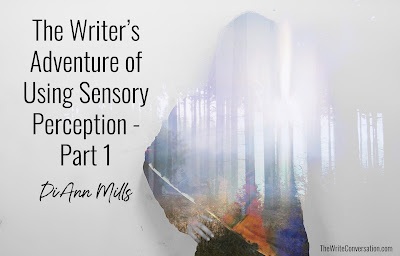by DiAnn Mills @DiAnnMills
“The beginning of human knowledge is through the senses, and the fiction writer begins where human perception begins.” Flannery O’Connor
Experiencing a scene through the senses pulls in the energy of credibility, but only if the writer uses relational and understandable language that emerges from the real inner character. Emotions are displayed in ways that show the story through a POV character. Our characters differ in culture, memory, role models, education, life history, ethnicity, and personality. Those qualities help determine how to relay emotions—or not —and what motivates the character into action. This is true of how a character participates in a sensory activity.
Sight
Sight isn’t limited to physical vision but dreams, imagination or mental imagery, and the character’s perception of the object—depth, color, and detected light. When we see or form a goal, we have vision, often viewed as hope for the future. Consider a mirage or the phrase: it’s a figment of my imagination.
The character filters what is seen much like looking at light through a prism. Other factors contribute to sight: age, color blindness, mental aptitude, and the health of the eye. What we see or don’t see impairs judgment and a perception of reality. Our characters face the same victories and challenges when they step into their reality.
“Imagination is more important than knowledge. Knowledge is limited. Imagination encircles the world.” Albert Einstein
Sound
Sounds are soft, loud, shrill, pleasant, unpleasant, or frightening. Sometimes a mixture. Like sight, characters hear through their life filters to interpret and an associated emotion. Writers use the familiar to bring the unique sound to life and provide an opportunity for the reader to feel a kinship.
The gentle tone of a father’s voice sooths a child, but the same words spoken in a harsh tone translate into anger or fear. What does the character hear and what emotional response do they form?
Use caution with onomatopoeia, a means of using a word that imitates the action. Poetry and some fiction benefit from the technique, but it often emphasizes telling instead of showing. A few onomatopoeia words to avoid: slam, crash, bang, pow, wham, splat, buzz, and I think you get the picture. Sometimes the technique works well, as noted in the quote below.
“Some words can also convey feelings without going full-on onomatopoeia. Ooze. Grunt. Scoff. Frumpy. Skittered. They’re not mimicking sounds, but we get a strong sense of their meaning by how they hit our ears.” Janice Hardy
Smell
The sense of smell may be one of our most powerful senses and it’s linked with taste. A writer introduces a woman with a distinct cologne. Whenever the male character notices the smell, he associates it with beauty, charm, and grace. But if the woman shuns him, he comes to despise the scent.
We value the odor of properly prepared food, fragrant flowers, herbs, and other growing plants. Smells can also warn us of danger or potential hazards.
Memory is more closely associated with smell than any of the other senses. Think back to a time when a unique odor triggered a pleasant, unpleasant, or forgotten memory.
A character who has lost their sense of smell suffers physically and mentally. Like us, our characters respond to smell according to personality, preference, and life experiences.
Next month, we will continue the discussion of sensory perception in our writing by exploring touch, taste, and our sixth sense.
My challenge to you is to dig deeper into your character’s life and discover how to show sensory perception. How are you using sight, sound, and the smells in your writing?
TWEETABLE
Don't Miss the Other Post in this Series!
DiAnn Mills is a bestselling author who believes her readers should expect an adventure. She creates action-packed, suspense-filled novels to thrill readers. Her titles have appeared on the CBA and ECPA bestseller lists; won two Christy Awards; and been finalists for the RITA, Daphne Du Maurier, Inspirational Readers’ Choice, and Carol award contests.
She is the former director of the Blue Ridge Mountain Christian Writers Conference, Mountainside Marketing Retreat, and Mountainside Novelist Retreat with social media specialist Edie Melson. Connect here: DiAnnMills.com


Hi I love this! Can I share it to my other writing groups?
ReplyDelete